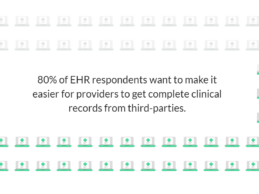What You Should Know: - Innovaccer is unveiling six new breakthrough solutions that help providers accelerate their success with population health, consumerism, and value-based care. - Leading the lineup is Sara, the first conversational AI for healthcare analytics. Sara is a conversational AI assistant that literally puts the full breadth and depth of enterprise healthcare analytics into the hands of healthcare managers, physicians, and care teams. Anyone can ask Sara complex questions
Read More
Claims Data
Thinking Beyond CRM to Reach Healthcare Consumers
A new type of purpose-built technology is necessary to manage patient relationships. Customer relationship management (CRM) systems are commonplace in nearly every industry, though their use in healthcare is complicated. Healthcare is incredibly complex and unique in many ways, and many generic CRM or CRM-like solutions address only one or two elements of the patient journey, such as appointment scheduling and reminders, without factoring in personal needs and preferences, health histories,
Read More
Study Reveals EHR Data Can Identify Patients Who Are Frail
What You Should Know: - AHRQ conducted a study to address the operational gap between CFIs and EFIs. This project focused on validating an established CFI using linked claims-EHR databases of multiple large health systems. The project provides a systematic approach that health systems can use to examine the quality of the EHR data and prepare it for the application of EFI measures. - The findings demonstrated that structured EHR data can be used by healthcare providers to identify frail
Read More
Experian Health Launches AI-Driven Predictive Denials Management
What You Should Know: - Experian Health launches a new AI-Powered solution, AI Advantage that will help providers recoup the billions in lost dollars due to insurance claim denials. - These new solutions leverage AI and help healthcare providers prioritize their claims reimbursement process and decrease denials overall, saving time and money across the entire healthcare value chain and ultimately improving care and service for patient consumers. AI Advantage One of the top
Read More
FHIR Adoption and Implementation Challenges
The Fast Healthcare Interoperability Resources (FHIR) standard was introduced by HL7 in 2014 as a significant replacement for the HL7 V2 and V3 standards. An open standard called FHIR, which was initially drafted in 2011 makes it easier than ever for legacy systems and new apps to exchange data. FHIR was created to not only increase communication efficiency and interoperability compared to earlier standards but also to facilitate implementation by giving clear specifications and allowing
Read More
80% of Healthcare Execs Want Complete Clinical Data From Other EHRs
What You Should Know: - Health Gorilla, a Health Information Network and interoperability provider, released it's inaugural 2023 State of Interoperability report today to understand how healthcare decision-makers are approaching their clinical data strategies in light of patient privacy concerns and new federal regulations. - The study, conducted in collaboration with Flexpa and the Health Management Academy, found that 60% of health systems report duplicative or incomplete data retrieved
Read More
Why EHR Data Is Key to Gathering More Accurate Medical Assessments
Patient data in electronic health records (EHRs) holds a wealth of insights that can enable health systems to better serve their patient populations. However, data from EHRs is challenging because this data is messy due to the lack of standardization in how clinical data is collected, and often times valuable information is buried in unstructured fields such as notes. Additionally, EHR data is disconnected from EHR data at other sites of care resulting in an incomplete view of the
Read More
4 Roadblocks That Are Hindering The Promise of Predictive Analytics
COVID-19 will likely impact and strain healthcare systems for many years to come — possibly even forever. As its attention wanes, we need technology to step in and tell us when and how to act next. What if there was a way to predict the next COVID-19 surge months before it affected operations? How many beds will be available? PPE? Where will you need to allocate additional resources and staff? What other seasonal uptick of disease will it align with? Will our revenue take a
Read More
AI/ML Used for Clinical Trial-Site Identification Simultaneously Improves Enrollment Rates and Diversity
Ethnic and racial minorities are commonly underrepresented in clinical trials. This problem is so severe that in April, the U.S. Food and Drug Administration (FDA) expanded upon existing guidance to further emphasize recommendations to sponsors developing treatments to increase enrollment from underrepresented populations in the U.S., including African-American, Hispanic, Asian and other persons of color, in clinical trials. In the updated guidance, the FDA provided details on what sponsors
Read More
4 Roadblocks Hindering The Promise of Predictive Analytics
COVID-19 will likely impact and strain healthcare systems for many years to come — possibly even forever. As its attention wanes, we need technology to step in and tell us when and how to act next. What if there was a way to predict the next COVID-19 surge months before it affected operations? How many beds will be available? PPE? Where will you need to allocate additional resources and staff? What other seasonal uptick of disease will it align with? Will our revenue take a
Read More










